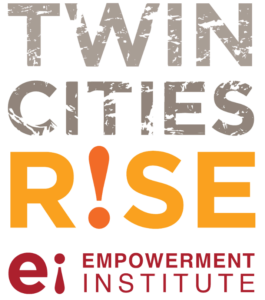May 4, 2016 (Published in the Southwest Journal)
Full Article
Juanita Moss credits Twin Cities Rise with helping her turn her life around during a dark chapter.
She graduated from one of the North Minneapolis-based nonprofit’s job training programs in November and now works full time as a certified clinical medical assistant at Open Cities Health Center in St. Paul.
She said Twin Cities Rise helped her rebuild self esteem while she struggled with a bad relationship and her son’s traumatic brain injury. The organization allowed her to find an internship, achieve certification as a medical assistant and even get scrubs when she needed them.
“I wouldn’t be where I’m at today if it wasn’t for them,” Moss said. “I’d probably still be depressed and in a rut.”
For more than 20 years, Twin Cities Rise has helped people rise out of poverty by providing job training, help with finding full-time work and developing the emotional skills needed to overcome serious challenges, such as chronic poverty, addiction and incarceration.
The programs offered include basic work skills training, personal empowerment training, employment placement services, special programs for recently incarcerated people and internship programs, among other things.
“It’s not about just getting a job,” senior program director Shereese Turner said. “It’s really helping them see that there’s a career opportunity.”
Turner said Twin Cities Rise has adapted its programs over the past few years to respond to employers’ needs in an improving economy. It still requires all participants to undergo personal-empowerment training, but no longer requires them to undergo all of the technical training.
Steve Rothschild, a former General Mills executive, founded the nonprofit in 1993. He began with a pilot program for 19 men and found each of them a job.
The men struggled with soft skills, such as showing up on time and getting along with their bosses, said the nonprofit’s current CEO Tom Streitz. Just two had a job after about six months, leading Rothschild to develop the personal-empowerment curriculum.
“Once that was put in place, that’s when our retention rate took off,” Streitz said.
The personal-empowerment curriculum addresses underlying issues such as poverty and trauma while helping them identify back to their core values. Participants talk with their classmates about past negative experiences and learn how to think before reacting.
“We try to get the individuals to start looking at themselves more deeply than the label,” said Vincent Fuller, who teaches the class. “There are so many things inside me that I should be touching base with.”
The curriculum has gained national recognition with multiple colleges and nonprofits using it as part of their own leadership-development training. Twin Cities Rise leaders credit it with contributing toward the organization’s success at keeping its participants in jobs.
More than 80 percent of Twin Cities Rise graduates retain their jobs after one year, which is more than double the national average for similar programs. About 77 percent are on the job after two years.
Previously incarcerated participants have a recidivism rate of 11 percent, compared to the state average of 61 percent.
Stretiz said people who have gone through the nonprofit’s programs have produced more than $165 million in wages and $33 million in taxes since 1997. On average, participants go from making about $5,000 annually to a beginning salary of $27,000.
The organization has also added a service-industry training program and a mechanic-technician training program in coordination with Metro Transit and Hennepin Technical College.
“What we’re doing now is actually responding to the needs of the community and the market,” Turner said. “Instead of coming in and we would have you go through five classes before, you may only need one or two classes. We’re responding to your needs now.”
Twin Cities Rise’s core mission hasn’t changed despite the shift, however. It continues to provide mentoring and coaching to participants even after they graduate from the program.
“One of our staff members always say that when you sign up, it’s like you’re marrying us,” she said. “We don’t get too many divorces, put it that way. We’ve been sustaining many, many marriages here.”
>>
Twin Cities Rise
Location: 1301 Bryant Ave. N.
Contact: 612-338-0295
Website: twincitiesrise.org
Year founded: 1993
>>
What you can do
Help with mock interviews. Upcoming dates are available in June to help with interviewing practice.
Present a workshop, become a tutor or in-class assistant or host an intern at your workplace.
Donate to Twin Cities Rise at its website, twincitiesrise.org.
>>
By the numbers
— 84: Percent of 2015 Twin Cities Rise graduates who retained their job after one year
— $26,799: The average starting income for 2014 program graduates, up from less than $5,000 at the start of the program
— 713: The number of low-income adults served by the nonprofit in 2014
— 16 percent: Recidivism rate for Twin Cities Rise graduates
— 61 percent: Overall recidivism rate for ex-offenders in Minnesota
>>
About the Where We Live project
This project is an ongoing series spearheaded by Journals’ publisher Janis Hall showcasing Minneapolis nonprofits doing important work in the community. The editorial team has selected organizations to spotlight. Nate Gotlieb is the writer on the project.


